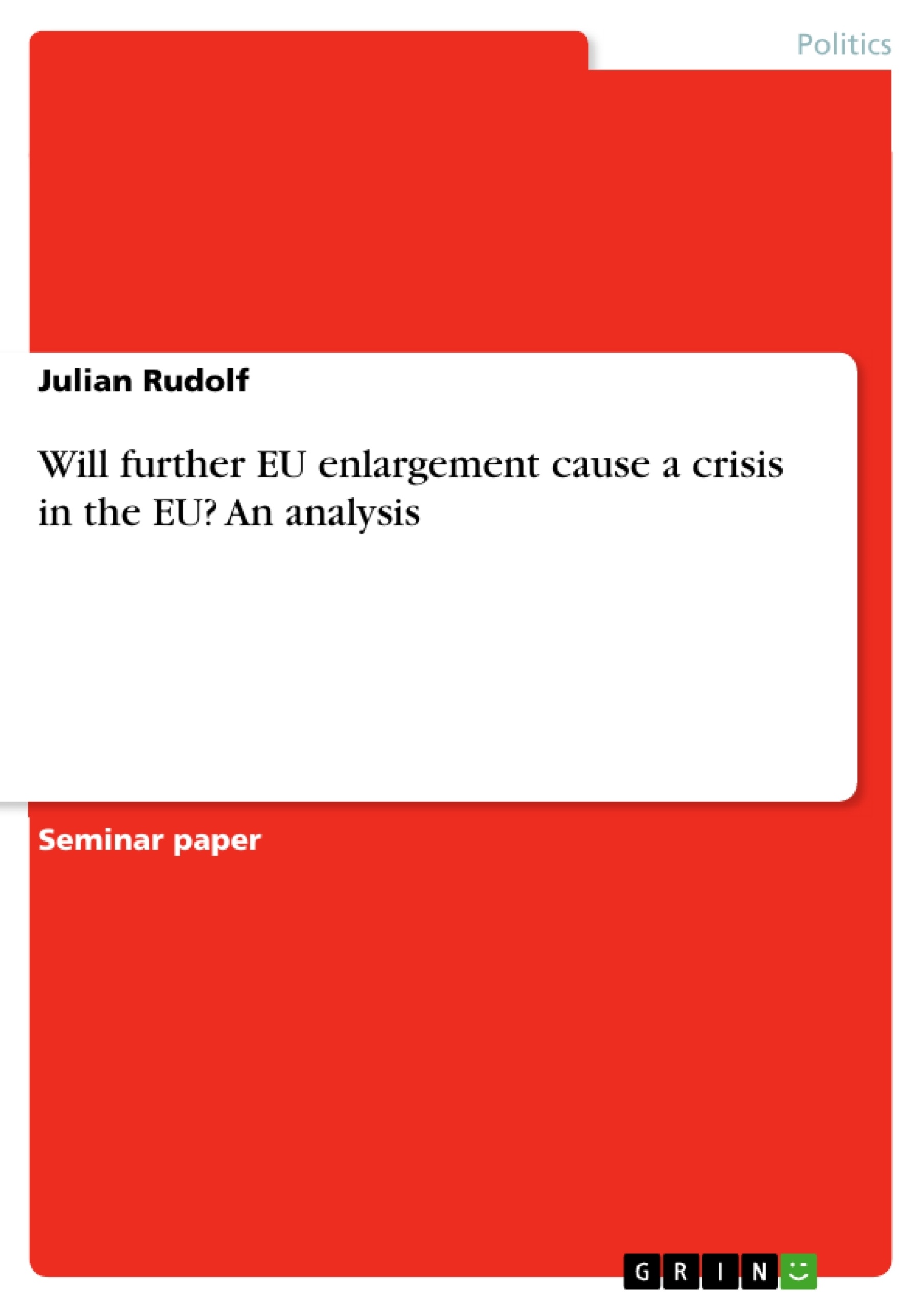Since its foundation the European Union has expanded several times. At the beginning only 6 member states were part of the EU. In more than 50 years a lot more European states joined the European Union. Each expansion changed the European Union regarding cultural, economical and geographical aspects. Enlargement has always been an important topic for the EU and will also be important in the near future.
Enlargement has a high impact on the European Union. This causes both positive and negative effects for the organization. The following seminar paper focuses on challenges and negative effects caused by the EU enlargement. Based on the potential challenges, it will focus on the question, whether further EU enlargement will cause a crisis in the European Union.
The seminar paper is structured in four chapters.
The first chapters give a short overview about the history of the EU Enlargement and explain the process of enlargement in detail. Following this, selected economic challenges and effects on the running of the EU caused by enlargement will be presented and discussed against the backdrop of the question, whether further EU enlargement can cause a crisis in the EU.
The seminar paper will only focus on selected economic challenges and challenges for the institutions of the EU because of the limited number of pages.
Inhaltsverzeichnis (Table of Contents)
- INTRODUCTION
- HISTORICAL BACKGROUND AND CURRENT DEVELOPMENTS OF EU ENLARGEMENT
- FROM SIX STATES TO 28 - SHORT HISTORY OF THE EU ENLARGEMENT
- POTENTIAL CANDIDATES AND CANDIDATE COUNTRIES
- THE ACCESSION PROCESS
- CONDITIONS FOR MEMBERSHIP AND IMPORTANT STEPS OF THE ACCESSION PROCESS
- LEGAL BASIS AND OBJECTIVES OF THE EUROPEAN UNION
- SELECTED CHALLENGES FOR THE EU CAUSED BY ENLARGEMENT
- EFFECTS ON THE RUNNING OF THE EU INSTITUTIONS
- SELECTED ECONOMIC CHALLENGES CAUSED BY ENLARGEMENT
- DEMANDS ON STRUCTURAL FUNDS
- UNEMPLOYMENT IN THE EU
- THE FUTURE OF EU ENLARGEMENT: WILL FURTHER EU ENLARGEMENT CAUSE A CRISIS IN THE EU?
Zielsetzung und Themenschwerpunkte (Objectives and Key Themes)
This seminar paper explores the potential challenges and negative effects of EU enlargement. It examines whether further enlargement could lead to a crisis within the European Union. The paper analyzes historical developments, the accession process, and selected economic challenges, focusing on the impact on EU institutions. Here are some key themes explored in the paper:- The historical evolution of EU enlargement from its initial six members to its current 28.
- The accession process, including conditions for membership and key steps.
- The potential economic challenges associated with enlargement, particularly the strain on structural funds and unemployment rates.
- The impact of enlargement on the functioning of EU institutions.
- The question of whether further enlargement could trigger a crisis in the EU.
Zusammenfassung der Kapitel (Chapter Summaries)
- Introduction: This chapter introduces the topic of EU enlargement, highlighting its significance and the potential challenges it presents. The paper focuses on the negative effects of enlargement and examines whether it could lead to a crisis within the EU.
- Historical Background and Current Developments of EU Enlargement: This chapter provides a brief overview of the history of EU enlargement, outlining the stages of expansion from the initial six member states to its current membership. It also examines the potential candidate and candidate countries for future expansion.
- The Accession Process: This chapter delves into the detailed process of joining the EU, outlining the conditions for membership and key steps involved. It also explores the legal basis and objectives of the European Union.
- Selected Challenges for the EU Caused by Enlargement: This chapter examines various challenges faced by the EU due to enlargement, including effects on the functioning of EU institutions and selected economic challenges. It specifically examines the demands on structural funds and the issue of unemployment within the EU.
Schlüsselwörter (Keywords)
This seminar paper focuses on the potential crisis caused by EU enlargement. Key terms include: EU enlargement, accession process, economic challenges, structural funds, unemployment, EU institutions, crisis potential. The paper explores the impact of expansion on the EU's economic and institutional stability, highlighting the challenges associated with further integration.Frequently Asked Questions
Will further EU enlargement cause a crisis in the EU?
The paper analyzes this complex question by discussing economic challenges and the impact on EU institutions, weighing potential risks against benefits.
What are the main economic challenges of EU enlargement?
Key challenges include the high demand on structural funds to support poorer new members and the potential impact on unemployment rates across the union.
How does enlargement affect EU institutions?
Adding more member states can complicate decision-making processes and require structural reforms to ensure the EU remains functional and efficient.
What is the accession process for new EU members?
Candidates must meet specific conditions for membership (Copenhagen criteria) and go through several legal and political steps before joining.
How has the EU grown historically?
The EU started with six founding members and has expanded several times over 50 years to include 28 member states (as of the paper's timeframe).
- Quote paper
- Julian Rudolf (Author), 2016, Will further EU enlargement cause a crisis in the EU? An analysis, Munich, GRIN Verlag, https://www.grin.com/document/341967



